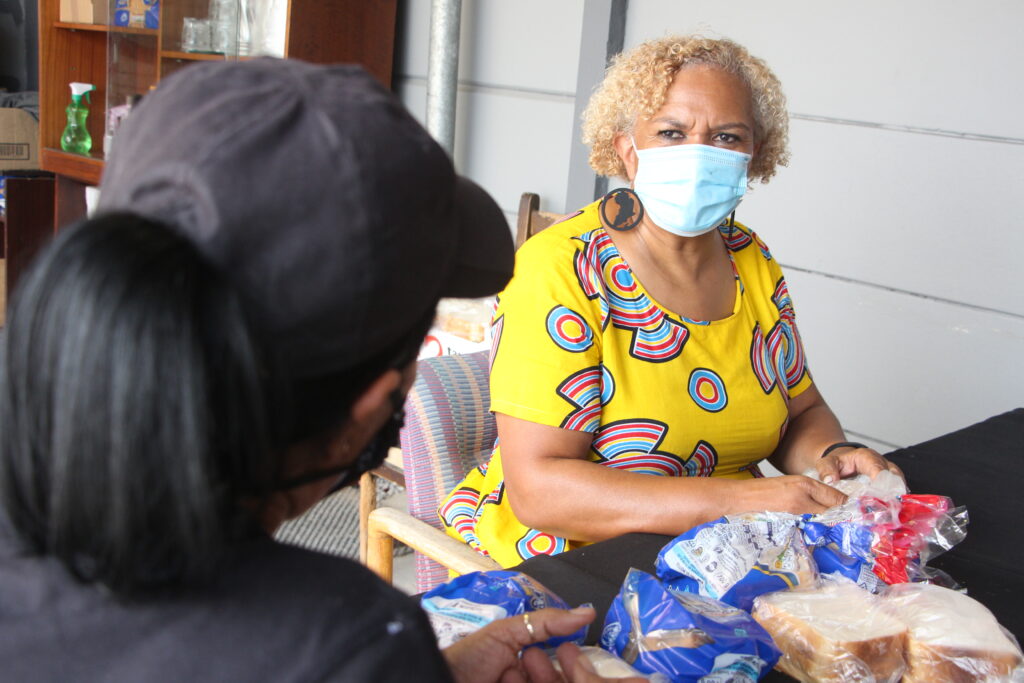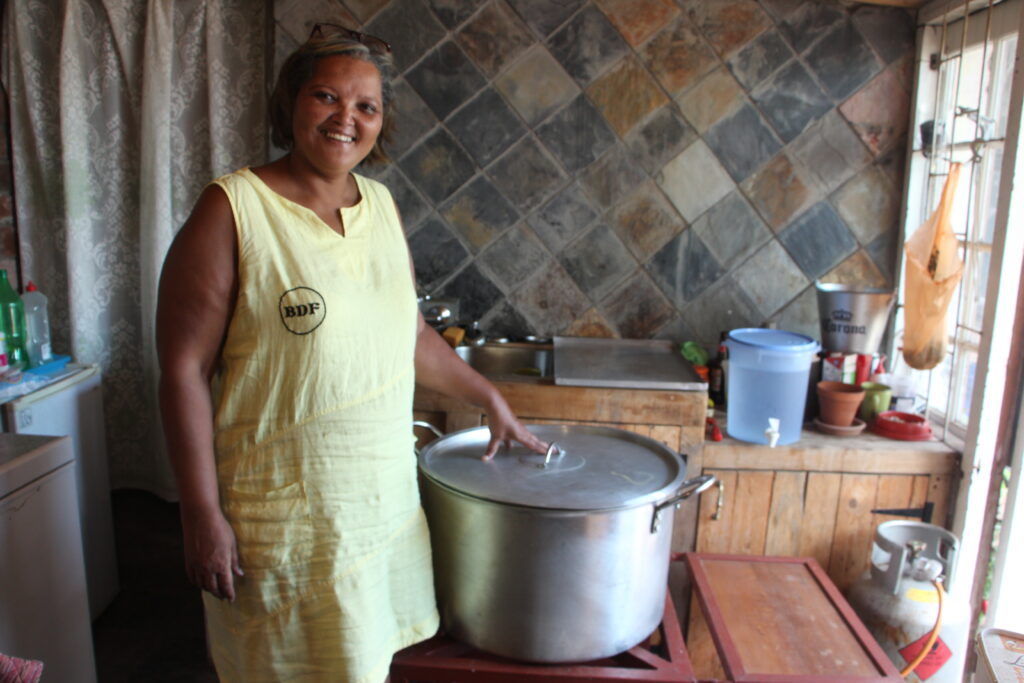This story is published as part of a series
supported by the IIE Community Justice Project
Despite the high levels of violence against women, South Africa is undergoing a feminist revolution, according to activists
Two young women stand at the office door of the Callas Foundation in Athlone, Cape Town, waiting for help to register their children at a local primary school. Caroline Peters, its founder, is showing a municipal officer around the non-profit. The official is checking that Peters meets municipal regulations as her organisation is based at her home. Her staff are cooking two large pots of food to be dished out later for people who do not have meals at home.
When Callas sits down to catch her breath, she gets a phone call about yet another woman who needs to get out of an abusive relationship with a man she lives with.
She gets too many of these calls.
“This organisation started because sexually abused women came to my house for help,” says Callas of her work. “Yesterday a woman came here early in the morning. We got her to a shelter and had her husband arrested.”

With the foundation’s involvement, the police came and helped fetch the woman and her children.
Getting the law involved is crucial, says Callas. “Usually in that situation, when a husband comes back home angry, then it’s worse so we wanted her to be out of the area.”
The foundation is one of the many organisations in South Africa that defends women’s rights. They daily mop up women’s blood in a country where gender-based violence comprises some of the most violent crimes: rape, mutilation and murder meted out against even girl children.
It is a continuous war on women, who are also fighting back on various fronts. Femicide in South Africa is five times higher than the global average, with a woman murdered every three hours, according to official statistics. Nearly 150 sexual offences are reported every day, the majority being rape. And activists say this number is significantly lower than reality because people do not trust the police.
Gail Smith, a journalist and feminist who has worked as spokeswoman for the South African Human Rights Commission, says a “feminist revolution is underway in South Africa, challenging patriarchy and its oppression of women”.
Smith was recently the executive producer on South Africa’s first unapologetically feminist talk show, It’s a Feminist Thing, produced for the Soul City Institute which promotes women’s rights.
“If you look at the shutdowns and all of the women’s marches in the last two years, there’s a feminist revolution happening. And women who are fighting the system, there is a demonisation of them.”
While organisations such as the Callas Foundation are working to dismantle abuse in homes and protect women, one of the big steps forward is in challenging inequality by using the legal system. For this, the foundation works with the Women’s Legal Centre.

It has helped in securing inheritance for widows, assisting frontline organisations like the Callas Foundation obtain protection orders for abused women and even protecting women activists from politicians.
The centre’s director, Seehaam Samaai, says: “We all know the legal system is not conducive to women. The law discriminates against women.
“When you go through the criminal justice system there is a lot of secondary victimisation, where the victim has to continually go through the trauma of what she had to go through because the system is not helping women to move forward.”
In a society where men have, and take, power the law is often the one thing that can force a rebalance.
Callas says the Covid-19 lockdowns made this step particularly important, because women could not escape abusive partners at home. “We need to use the law to stop these men.” To this end, the centre got permits to move around and remove women from abusive situations.
She adds: “Women were trapped inside their homes. I would find women outside on the street and ask why are they sitting in the street. They said it would be safer to sit in the street than go home where they are abused.”
Kuchochea mapinduzi ya wake Africa kusini
Licha ya vurugu kubwa dhidi ya wanawake, Afrika Kusini inapitia mapinduzi ya Kiukekulingana na wanaharakati.
Vijana wawili wa kike, wanasimama mlangoni mwa ofisi wa shirika la Callas huko Athlone, Capetown, wakingoja msaada wa kusajili watoto wao katika shule ya msingi.
Caroline Peters, mwanzilishi wa shirika hili, anampa ziara afisa wa manispaa kwenye shirika hilo.
Afisa huyo anakagua kuwa Peters anakidhi kanuni za manispaa kwani shirika lake liko nyumbani kwake. Wafanyikazi wake wanapika sufuria mbili kubwa za chakula zitakazoandaliwa baadaye kwa watu ambao hawana chakula nyumbani mwao.

Wakati Callas anakaa kupata pumzi yake, anapigiwa simu kuhusu kesi ingine ambayo mwanamke anahitaji kutoka kwenye uhusiano wa dhuluma na mwanaume anayeishi naye.
Yeye hupata simu nyingi kama hizi.
“Shirika hili lilianza kwa sababu wanawake wanaodhulumiwa kingono walikuja nyumbani kwangu kuomba msaada,” anasema Callas kuhusu kazi yake. “Jana mwanamke alikuja hapa mapema asubuhi. Tulimfikisha kwenye makao yao na mumewe akatiwa mbaroni”
Pamoja na usaidizi wa shirika hili, polisi waliweza kumchukua mwanamke huyo na watoto wake hadi pahali pa salama.
Callas alisisitiza umuhimu wa kutumia vitengo mbalimbali za sheria ikiwemo polisi “Kawaida katika hali hiyo, wakati mume anarudi nyumbani akiwa na hasira, Ilibidi tuhakikishe kuwa yupo inje ya eneo hilo.”
Hili shirika ni moja ya mashirika mengi nchini Afrika Kusini ambalo linatetea haki za wanawake.
Kila siku hupanguza damu ya wanawake katika nchi ambayo unyanyasaji wa kijinsia unajumuisha uhalifu mkali zaidi: ubakaji, ukeketaji na mauaji dhidi ya watoto wa kike.
Ni vita vinavyoendelea dhidi ya wanawake, ambao pia wanajipigania kwa pande tofauti.
Kuuawa kwa wanawake nchini Afrika Kusini ni juu mara tano kuliko wastani wa ulimwengu, namwanamke anauawa kila masaa matatu, kulingana na takwimu rasmi. Karibu makosa 150 ya kijinsia yanaripotiwa kila siku, mengi yakiwa ya ubakaji. Na wanaharakati wanasema idadi hii ni ya chini sana kuliko ukweli kwa sababu watu hawaamini polisi.
Gail Smith, mwandishi wa habari na mwanamke aliyefanya kazi kama msemaji wa Tume ya Haki za Binadamu ya Afrika Kusini, anasema “mapinduzi ya wanawake yanaendelea katika Tume ya Haki za Binadamu ya Afrika Kusini kupinga mfumo dume na ukandamizaji wa wanawake.”
Smith hivi karibuni alikuwa mtayarishaji mtendaji wa kipindi cha kwanza cha wanawake wa Afrika Kusini “Kisicho na pole” Ni Jambo la Kike, iliyoundwa kwa taasisi ya Soul city ambayo inakuza haki za wanawake.
“Ukiangalia kuzimwa na maandamano yote ya wanawake katika miaka miwili iliyopita, kuna mapinduzi ya kiufeministi inayotokea. Na wanawake ambao wanapambana na mfumo huu wanachafuliwa jina”
Wakati shirika kama vile Callas Foundation inatia bidi kumaliza unyanyasaji majumbani na kulinda wanawake, moja ya hatua kubwa mbele ni katika kupinga kutokuwepo sawa kwa kutumia mfumo wa sheria. Kwa hii, shirika hufanya kazi na Kituo cha Sheria ya Wanawake.
Imesaidia kupata urithi wa wajane, kusaidia mashirika ya mbele kama vile Shirika la Callas kupata maagizo ya ulinzi kwa wanawake wanaonyanyaswa na hata kuwalinda wanaharakati wa kike kutoka kwa wanasiasa.
Mkurugenzi wa Kituo hicho, Seehaam Samaai, anasema “Sote tunajua mfumo wa sheria sio mzuri kwa wanawake.Sheria inabagua dhidi ya wanawake.”

Unapopitia mfumo wa haki ya jinai kuna udhalilishaji mwingi wa sekondari, ambapo mhasiriwa analazimishwa kupitia kiwewe cha kile alichokipitia kwa sababu mfumo huo hauwasaidii wanawake kusonga mbele.
Katika jamii ambayo wanaume wana uwezo na huchukua nguvu, sheria mara nyingi ni jambo moja ambalo linaweza kulazimisha usawa.
Callas anasema kusitisha shughuli za kawaida kwenye kipindi cha Covid 19 kulifanya hatua hii kuwa muhimu sana, kwa sababu wanawake hawangeweza kutoroka wenzi wao waliowanyanyasa nyumbani.
“Tunahitaji kutumia sheria kuwazuia hawa wanaume.”
Kwa ajili ya hayo, kituo hicho kilipata vibali vya kuzunguka na kuwaondoa wanawake katika hali za dhuluma.
Anaongeza, “Wanawake walinaswa ndani ya nyumba zao. Ningepata wanawake nje barabarani na kuuliza ni kwanini wamekaa barabarani. Walisema itakuwa salama kukaa barabarani kuliko kurudi nyumbani ambako wanakodhulumiwa.”